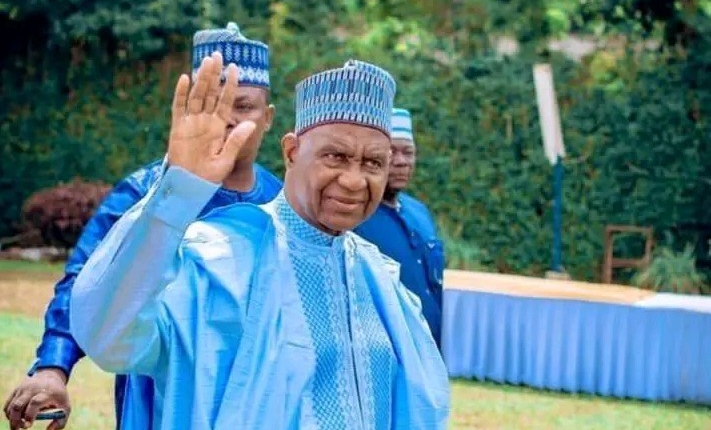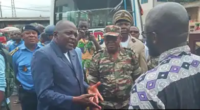Bello Bouba Maigari’s Federalism or Confederation Pledge: Is This What Ambazonians Died For?
By Andre Momo
In a bold pitch to voters in the restive Southwest Region, presidential hopeful Bello Bouba Maigari has dangled the prospect of federalism as a balm for Cameroon’s long-simmering Anglophone crisis. But as the October 2025 election looms just weeks away, the question lingers: Is this the resolution that the thousands who have perished in the conflict truly sought? For many Ambazonians— the self-proclaimed name for the independence-seeking English-speaking population of the Northwest and Southwest regions—federalism may feel like a half-measure, far short of the outright secession they have fought and died for since 2017.
Maigari, the 78-year-old leader of the National Union for Democracy and Progress (UNDP), made his federalist pledge during a rally in Limbe on September 4. Addressing a crowd of supporters, he vowed to “return Cameroon to a federal form of state” if elected, emphasizing dialogue and a referendum to let the Northwest and Southwest regions choose between federation or even confederation, complete with “special status.” This comes amid ongoing violence in the Anglophone regions, where separatist groups have clashed with government forces, resulting in over 6,000 deaths and displacing hundreds of thousands since the crisis erupted.
The event itself was not without drama. Local authorities initially attempted to ban the rally, citing security concerns—a move Maigari’s camp attributed to pressure from the ruling Cameroon People’s Democratic Movement (CPDM). However, intervention by the Senior Divisional Officer for Fako Division allowed it to proceed, underscoring the tense political atmosphere as opposition figures navigate restrictions ahead of the polls. Maigari, a former Tourism Minister and long-time ally of President Paul Biya until recently breaking ranks, has been on a whirlwind tour, including consultations in the Northwest Region the previous Saturday.
Beyond the constitutional overhaul, Maigari sweetened his appeal with economic incentives tailored to the Southwest. He promised to elevate the Limbe Deep Seaport into a major maritime hub and construct a direct road linking Limbe to Nigeria, potentially boosting trade and connectivity in a region plagued by insecurity and underdevelopment. These vows tap into local frustrations over neglected infrastructure, but they also highlight Maigari’s strategy to position himself as a pragmatic alternative in a field dominated by Biya’s perennial bid for re-election at age 92.
To understand the weight of Maigari’s offer, one must revisit the roots of the Anglophone crisis. What began in 2016 as peaceful protests by lawyers, teachers, and civil society against the perceived “francophonization” of the common-law system and bilingual education quickly escalated. Initially, demands centered on restoring the federal structure that existed briefly after Cameroon’s 1961 reunification, when the English-speaking Southern Cameroons joined the French-speaking republic as a semi-autonomous partner. But a brutal government crackdown— including arrests, internet shutdowns, and military deployments—radicalized the movement. By late 2017, separatist factions declared “Ambazonia” an independent republic, waving its blue-and-white flag and enforcing “ghost towns” to protest Yaoundé’s rule.
Today, the separatist cause is fragmented among armed groups, but their core demand remains unambiguous: full independence, not a diluted federalism. As one analysis of the conflict notes, what started as calls for federalism “degenerated into fighting and a demand for full independence” after the government’s refusal to engage meaningfully. Pro-federalist voices, such as the Cameroon Anglophone Civil Society Consortium, were sidelined or arrested, leaving the battlefield to hardliners who view any compromise short of sovereignty as betrayal. With over 700,000 internally displaced and reports of widespread human rights abuses on both sides, the bloodshed has only hardened positions.
Maigari’s proposal, while progressive compared to Biya’s unitary state dogma, thus arrives in a vacuum of distrust. A referendum on federation or confederation sounds democratic, but separatists have long dismissed such mechanisms as rigged, pointing to the 1961 plebiscite that many now see as manipulated to deny Southern Cameroons true self-determination. Confederation—a looser union—might appeal to moderates weary of war, but for the diaspora and armed factions abroad, it reeks of assimilation. Is this what the “people died for,” as the rally’s subtext implies? Hardly. The graves of Ambazonian fighters, from schoolchildren gunned down in ghost towns to civilians caught in crossfire, demand more than a regional veto on governance structures.
Politically, Maigari’s gambit is savvy. As a Northerner with decades in government, he positions the UNDP as a bridge between Biya’s CPDM and opposition forces like the Social Democratic Front (SDF). His recent split from the ruling alliance has irked CPDM hardliners, but it frees him to court Anglophone votes without the baggage of Yaoundé’s repression. Yet, with the election board (ELECAM) under government sway and opposition candidacies often challenged, Maigari’s path to victory is steep. His Limbe turnout—enthusiastic but modest—signals potential in the Southwest, but the Northwest’s insecurity may limit broader gains.
In the end, Maigari’s vision could catalyze dialogue if he defies odds and wins, offering a federal reset that echoes the 1961 Fo Federal Constitution scrapped by Ahmadou Ahidjo in 1972. But without addressing separatist grievances head-on—perhaps through international mediation—the promise risks being another unfulfilled pledge in Cameroon’s cycle of unrest. For Ambazonians, the real question isn’t federalism’s merits, but whether it ends the killing. As the campaign heats up, Yaoundé’s silence on these overtures speaks volumes: true peace may require more than election rhetoric.




